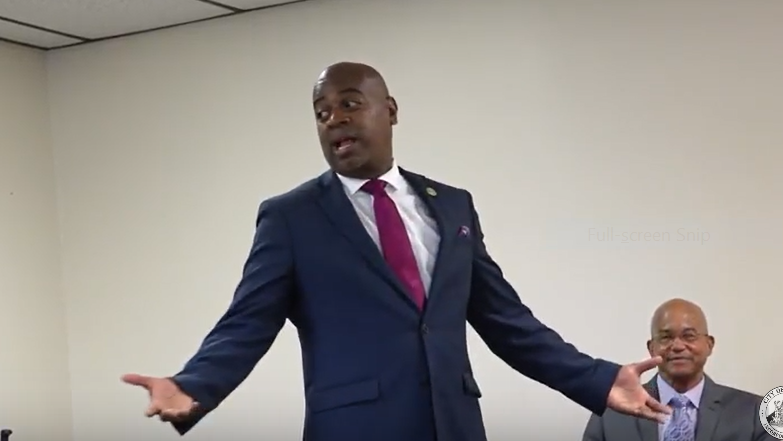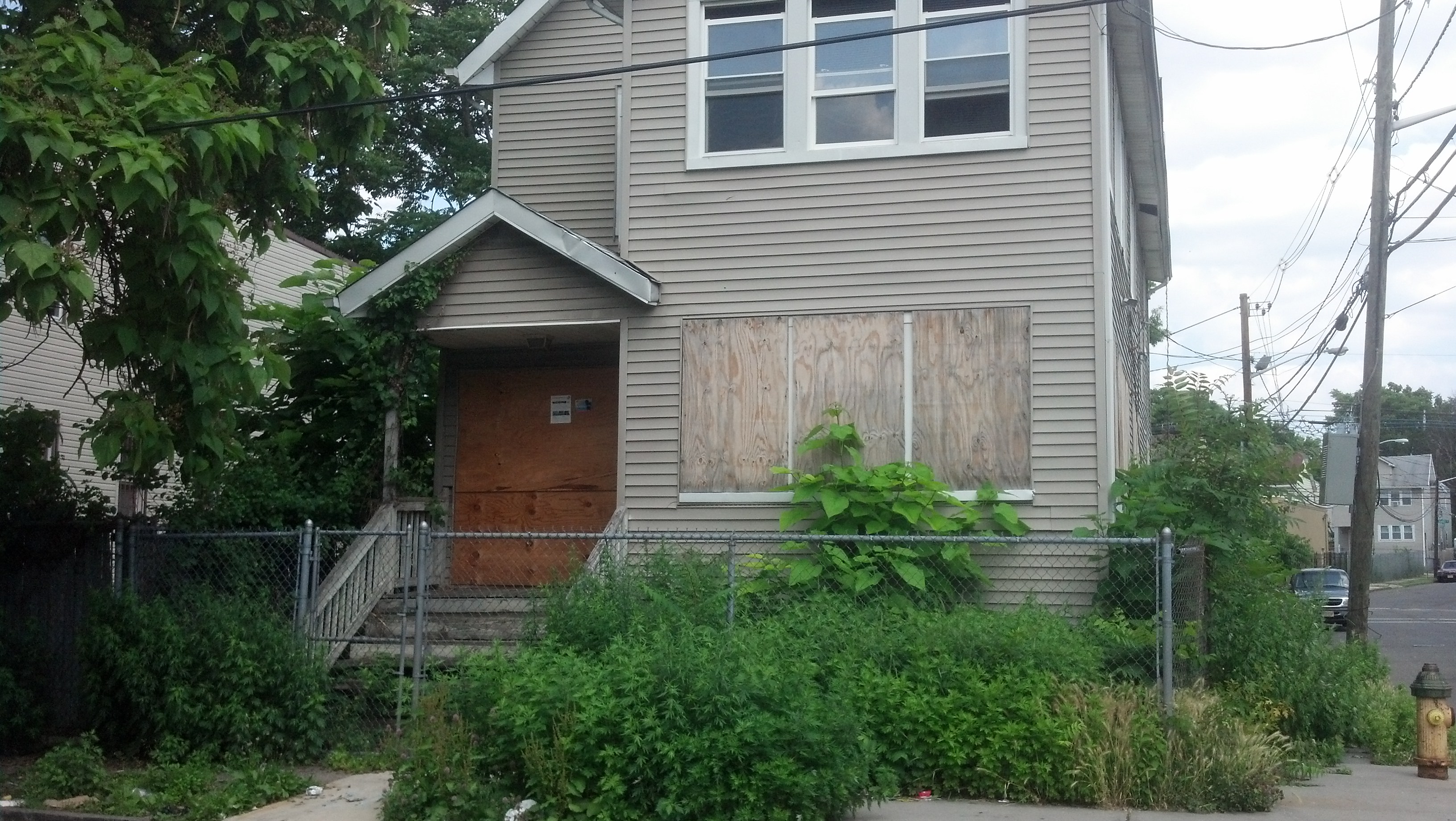Baraka's Learning Curve: Getting the Lead Out

After being pummeled in the national media for not acting quick enough to remediate the lead contamination in the city’s water, Newark Mayor Ras Baraka has pledged to replace all of the buried lead water service lines that have been flagged as a problem in the next 24 to 30 months, instead of the decade originally forecast.
It may have been the news media’s comparing Newark and New Jersey’s response to that of Flint and Michigan handling of their lead crisis that inspired the acceleration.
The $120 million plan is an ambitious one considering the scope and the scale of the undertaking and won some words of praise from Erik Olson, with the Natural Resources Defense Council, which has been using the courts to compel the Baraka administration to be more pro-active.
“I don’t know of any other city of this size that has tried to replace all their lead service lines in this kind of time frame,” Olson, told the New York Times.
NATIONAL SCOURGE
The horrific reality is that the issue of lead contamination is a national scourge we have been ignoring. As Reuters reported in May of 2016, after the Flint water scandal broke, in the United States there were “nearly 3,000 areas with recently recorded lead poisoning rates at least double those in Flint during the peak of that city's contamination crisis. ... And more than 1,100 of these communities had a rate of elevated blood tests at least four times higher.”
Reuters' map of the lead crisis extended “from Warren, Pennsylvania, a town on the Allegheny River where 36 percent of children tested had high lead levels, to a zip code on Goat Island, Texas, where a quarter of tests showed poisoning. In some pockets of Baltimore, Cleveland and Philadelphia, where lead poisoning has spanned generations, the rate of elevated tests over the last decade was 40-50 percent.”
DENIAL NOT A RIVER
Since lead was first found in Newark’s water back in June of 2017, Mayor Baraka has been on the losing end of a running skirmish with the NRDC and the Newark Education Workers Caucus, made up of members of the Newark Teachers Union and the community.
The NRDC and NEW were pressing the city to be more forthcoming with information about the contamination which can have life-long serious developmental consequences for the city’s children. On the NRDC’s Newark Water project website is a concise tick tock account of that struggle that culminated in the environmental group and their community-based partners taking the City of Newark to court back in May of 2018.
After dozens of months of trying to downplay the scale and scope of the problem, the city was told earlier this month by the U.S. EPA that the city issued water filters were not doing the job and that Newark needed to start supplying bottled water to 15,000 households that were at risk.
BIGGER THAN THE PIPES
Up until Monday’s press conference with Baraka and Governor Phil Murphy promising quicker action, the official response had done little to inspire public confidence. Gov. Murphy’s Aug. 22 appearance on MSNBC’s 11th Hour with Brian Williams was emblematic.
The Governor was on the defensive, rejected any comparison to the Flint Michigan water crisis and insisted that Newark was not being treated any differently than other New Jersey municipality.
To myopically focus on the antiquated lead pipes that serve these neighborhoods in Newark is to be blind to the fact they are part of a city that’s been economically exploited twice, first when corporations left cities like Newark in the pursuit of higher profits overseas, and then during the Great Recession when the Federal government facilitated a Wall Street bail out that sunk millions of American households, many of them African-Americans.
Add in the racist ‘war on drugs’ that targeted young men of color for criminal prosecution for drug offences that should have been dealt with as a public health issue, and you get a feel for the gravity of Brick City’s burden.

PILLAGE BY WALL STREET
During the tenure of President Baraka Obama’s rescue of the global economy he fattened up America’s Wall Street banks like Goldman Sachs and Wells Fargo but let the Main Streets and Martin Luther King Jr. Boulevards sink into zombie home despair and disrepair. Years after the end of the Great Recession sthey till cast shadow on these communities.
As part of MSNBC’s set-up for the Murphy interview, Williams used a clip of Bishop Jethro James, of Newark’s Paradise Baptist Church telling Williams that he personally had been to the Governor’s house in Middletown, but that if Murphy’s neighborhood had lead contamination issues in its drinking water “they would be digging up the streets now changing the pipes going in.” He blasted Murphy saying he could “say anything” he wanted but that his inaction was speaking louder than his words.
During his interview the Governor wanted to impress on Williams that bottled water was being given out every day and that there were no lines at the distribution centers.
He just couldn’t seem to emotionally process what it means to people, already subject to deprivation, when they can’t count on the water where they live.
SPIN CYCLE
“You’ve got little kids growing up in Newark being tested for lead exposure and in danger of brain damage on top of being born with just about every other disadvantage we can name,” Williams posited for the Governor. “Do you believe this is a public health crisis?”
“It is a public health challenge for sure,” responded Murphy, remediating by using a euphemism.
He went on to put a political spin on his response. “I also want to make sure folks realize that for all the challenges Brian you just outlined, Newark is a city on the rise under a terrific Mayor Ras Baraka and I think any insinuation that we are dealing with Newark differently than we would with some other community has no basis in fact.”
If you know nothing of Newark’s history that might seem a comforting statement of magnanimous equanimity fitting for a post-racial utopia.
Yet, in a period when we are seriously debating reparations for the past crime against humanity that was slavery, its tragic that Murphy was oblivious to the moral imperative that we do indeed need to treat Newark very differently.
Murphy’s analysis of the moment at hand failed to acknowledge the racist legacy of neglect and abandonment that has physically manifested itself throughout post-World War II urban America right up until today, almost twenty years into the 21st century.
LOST HISTORY
And there is a collective amnesia, or just ignorance, about what actually happened in 1967 in Newark when a violent encounter between white police officers and an unarmed black man spiraled out of control and the National Guard and State Police response actually made matters worse, culminating in death and destruction that scared the city for generations.
The tragic details are laid out in an official account compiled by “The Governor’s Select Commission on Civil Disorder.” This document, known as the Lilley Report after its chairman, then AT&T President Robert D. Lilley, has slipped into undeserved obscurity.
In August of 1967, a month after Newark burned, Governor Hughes convened a blue-ribbon panel of religious, political, and legal leaders and charged them with generating “a realistic analysis of the disorders….and practical proposals” to help prevent a recurrence of the unrest.
Over months of investigation, the panel took sworn testimony from more than 100 including scores of Newark store owners and residents. The Commission concluded that members of both the police and the National Guard, motivated by racial prejudice, had used “excessive and unjustified force” on Newark residents, and had specifically targeted African American-owned businesses for destruction.
“These raids resulted in personal suffering to innocent small businessmen and property owners who have a stake in law and order and who had not participated in any unlawful act. It embittered the Negro community as a whole when the disorders had begun to ebb,” concluded the Commission.
LEAD IN THE AIR
Perhaps the most volatile issue raised by the breakdown of order in Newark was that of sniper fire and random lead flying through the air. During the days of unrest law enforcement and the National Guard claimed that they were fired on by snipers, whose shots led to the deaths of a Newark police detective and a Fire Captain responding to a fire call. While not outright rejecting this claim, the Lilley Report noted the doubts of Newark’s own Police Director at the time, Dominick Spina: “A lot of the reports of snipers was due to the, I hate to use the word, trigger-happy Guardsmen, who were firing at noises and firing indiscriminately, it appeared to me, and I was out in the field at all times.”
Out of the 26 fatalities during the five days of unrest, 23 (including a number of innocent bystanders) were from gunshot wounds. The Lilley report estimated that the National Guard and N.J. State police fired some 13,000 rounds in all. No total was available for the local police, who reported killing people, seven “justifiably” and three “by accident.”
It would seem lead free drinking water for Newark would be the least thing we could do.





